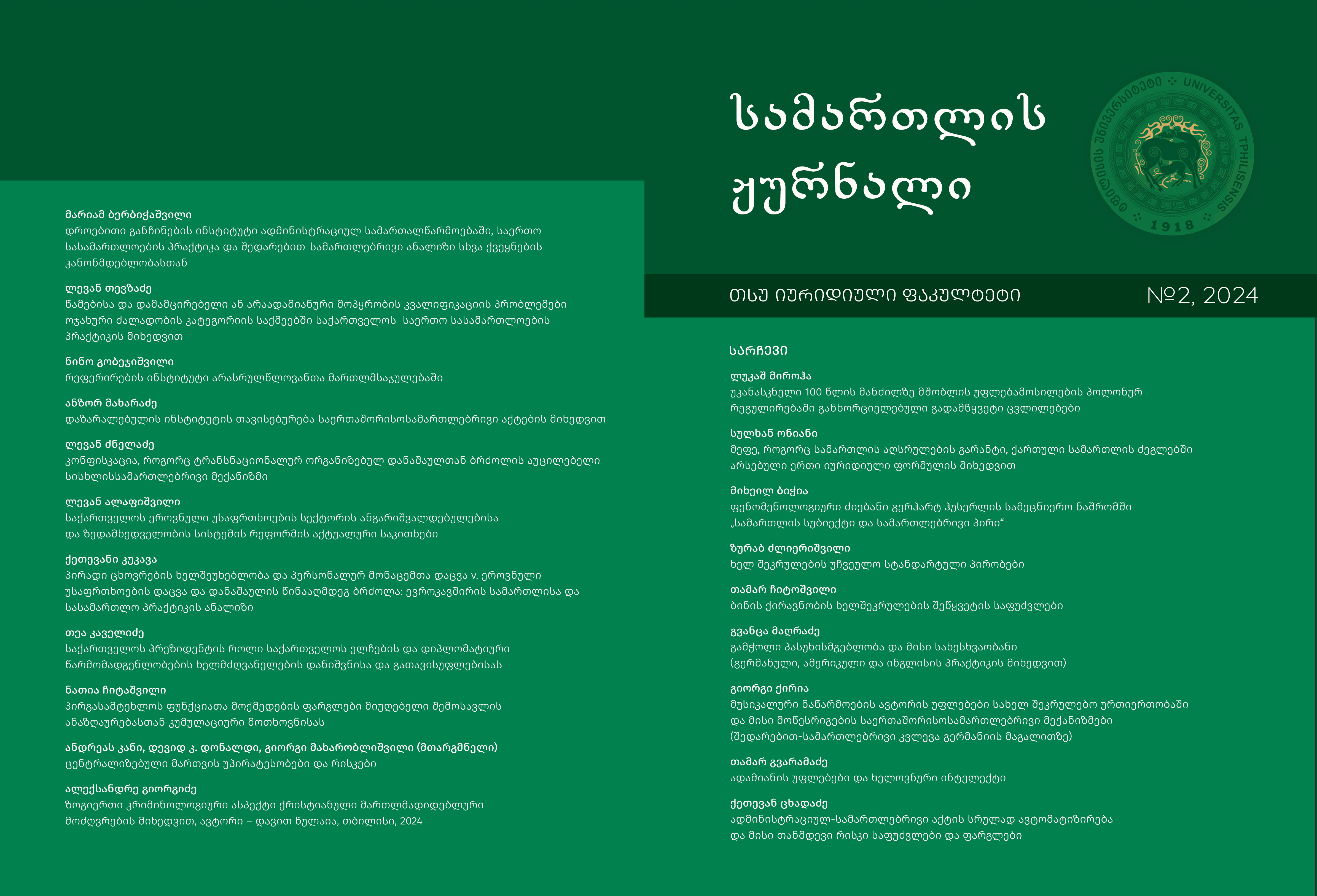წამებისა და დამამცირებელი ან არაადამიანური მოპყრობის კვალიფიკაციის პრობლემები ოჯახური ძალადობის კატეგორიის საქმეებში საქართველოს საერთო სასამართლოების პრაქტიკის მიხედვით
DOI:
https://doi.org/10.60131/jlaw.2.2024.8326საკვანძო სიტყვები:
წამება, დამამცირებელი მოპყრობა, არაადამიანური მოპყრობა, კვალიფიკაცია, ოჯახური ძალადობა, სასამართლო პრაქტიკა.ანოტაცია
საქართველოს საერთო სასამართლოების პრაქტიკაში დანაშაულის კვალიფიკაციის პრობლემა არც თუ ისე იშვიათი შემთხვევაა. განსაკუთრებით ეს ეხება ისეთ დანაშაულებს, რომელთა შორისაც, ზღვრის გავლება რთულია. ასეთ შემთხვევათა რიცხვში არის საქართველოს სისხლის სამართლის კოდექსის (შემდგომში - სსსკ) 1441 (წამება)[1] და 1443 (დამამცირებელი ან არაადამიანური მოპყრობა)[2] მუხლებით გათვალისწინებული დანაშაულები. მნიშვნელოვანია მათი გამიჯვნა - ერთმანეთისგან და სხვა დანაშაულებისგან.
სამეცნიერო სტატიაში წარმოდგენილია ოჯახური ძალადობის[3] კატეგორიის სისხლის სამართლის საქმეები, რომლებშიც ზემოხსენებულმა პრობლემამ იჩინა თავი და რომლებიც განხილულია საქართველოს სამივე ინსტანციის სასამართლოს მიერ.
საკვანძო სიტყვები: წამება, დამამცირებელი მოპყრობა, არაადამიანური მოპყრობა, კვალიფიკაცია, ოჯახური ძალადობა, სასამართლო პრაქტიკა.
[1] სსსკ-ს 1441 მუხლის პირველი ნაწილი - ,,წამება, ესე იგი პირისათვის ან მესამე პირისათვის ისეთი პირობების შექმნა ან ისეთი მოპყრობა, რომელიც თავისი ხასიათით, ინტენსივობით ან ხანგრძლივობით იწვევს ძლიერ ფიზიკურ ტკივილს ან ფსიქიკურ ან მორალურ ტანჯვას და რომლის მიზანია ინფორმაციის, მტკიცებულების ან აღიარების მიღება, პირის დაშინება ან იძულება ანდა პირის დასჯა მის ან მესამე პირის მიერ ჩადენილი ან სავარაუდოდ ჩადენილი ქმედებისათვის“.
[2] სსსკ-ს 1443 მუხლის პირველი ნაწილი - ,,პირის დამცირება ან იძულება, არაადამიანურ, პატივისა და ღირსების შემლახავ მდგომარეობაში ჩაყენება, რაც მას ძლიერ ფიზიკურ, ფსიქიკურ ტკივილს ან მორალურ ტანჯვას აყენებს“.
[3] სსსკ-ს 111 მუხლი ,,ოჯახური დანაშაული ნიშნავს ოჯახის ერთი წევრის მიერ ოჯახის სხვა წევრის მიმართ ამ კოდექსის 109-ე, 115-ე, 117-ე, 118-ე, 120-ე, 126-ე, 1331, 1332, 137-ე−141-ე, 143-ე, 144-ე−1443, 149-ე−1511, 160-ე, 171-ე, 187-ე, 253-ე−2551, 3811 და 3812 მუხლებით გათვალისწინებული დანაშაულის ჩადენას. ოჯახური დანაშაულისათვის სისხლისსამართლებრივი პასუხისმგებლობა განისაზღვრება ამ მუხლში აღნიშნული საქართველოს სისხლის სამართლის კოდექსის შესაბამისი მუხლით, ამ მუხლზე მითითებით“. ამავე მუხლის შენიშვნის პირველი ნაწილით ,,ამ კოდექსის მიზნებისთვის ოჯახის წევრად ითვლება: დედა, მამა, პაპა, ბებია, მეუღლე, არარეგისტრირებულ ქორწინებაში მყოფი პირი, შვილი (გერი), მინდობით აღსაზრდელი, მინდობით აღმზრდელი (დედობილი, მამობილი), დედინაცვალი, მამინაცვალი, შვილიშვილი, და, ძმა, მეუღლის მშობელი, არარეგისტრირებულ ქორწინებაში მყოფი პირის მშობელი, შვილის მეუღლე (მათ შორის, არარეგისტრირებულ ქორწინებაში მყოფი), ყოფილი მეუღლე, წარსულში არარეგისტრირებულ ქორწინებაში მყოფი პირი, მეურვე, მზრუნველი, მხარდამჭერი, მეურვეობისა და მზრუნველობის ქვეშ მყოფი პირი, მხარდაჭერის მიმღები, აგრეთვე პირები, რომლებიც მუდმივად ეწევიან ან ეწეოდნენ ერთიან საოჯახო მეურნეობას“.
წყაროები
"On Measures to Prevent and Suppress Violence against Women" Council of Europe Convention, 2011;
Criminal Code of Georgia;
Criminal Procedure Code of Georgia;
European Convention on Human Rights;
Bokhashvili B., Case Law of the European Court of Human Rights, Tbilisi, 2004;
Dvalidze I., Kharanauli L., Tumanishvili G., Tsikarishvili K., Crimes against human rights and freedoms according to the Criminal Code of Georgia, 2019;
Lekveishvili M., Mamulashvili G., Todua N., Private Part of Criminal Law, Book I, Part One, Tbilisi, 2023.
Mamaladze E., Dateshidze N., Prohibition of Torture: Reflecting the Standards Under Articles 3 and 6 of the European Convention on Human Rights in National Judicial Practice, Tbilisi, 2019;
Svanidze E., Effective Investigation of Mistreatment, European Standards Guidelines, Tbilisi.
Prohibition of torture, implementation of Article 3 of the European Convention on Human Rights, Guide, Tbilisi, 2005;
Judgement of Bolnisi District Court of November 13, 2018 on case No. 1/112-18;
Judgment of Gurjaani District Court of July 16, 2019 on case No. 1/45-19;
Judgement of the Criminal Chamber of the Tbilisi Court of Appeals of March 29, 2019 on case No. 1B/219-19;
Judgment of the Criminal Chamber of the Tbilisi Court of Appeals of November 27, 2020 on case No. 1b/728-20;
Judgment of the Criminal Chamber of the Tbilisi Court of Appeals of December 10, 2019 on case No. 1b/1819-19;
Judgment of the Criminal Chamber of the Tbilisi Court of Appeals of June 21, 2021 on case No. 1b/705-21;
Judgment of the Criminal Chamber of the Tbilisi Court of Appeals of November 29, 2019 on case No. 1b/1617-19;
Judgment of the Tbilisi City Court's Criminal Affairs Board of March 9, 2020 on case No. 1/4381-19;
Judgment of the Tbilisi City Court's Criminal Affairs Board of March 31, 2021 on case No. 1/4615-20;
Judgment of the Tbilisi City Court's Criminal Affairs Board of September 6, 2019 on case No. 1/1564-19;
Judgment of the Criminal Chamber of the Supreme Court of Georgia of November 1, 2019 on case No. 356AP-19;
Judgment of the Criminal Chamber of the Supreme Court of Georgia of June 25, 2021 on case No. 23AP-21;
Judgment of the Criminal Chamber of the Supreme Court of Georgia of April 10, 2020 on case No. 149AP-20;
Judgment of the Criminal Chamber of the Supreme Court of Georgia of September 28, 2021 on case No. 682AP-21;
Judgment of the Criminal Chamber of the Supreme Court of Georgia of April 5, 2019 on case No. 617AP-18;
Judgment of the Criminal Chamber of the Supreme Court of Georgia of June 25, 2020 on case No. 107AP-20;
Smith Rh. K. M., International Human Rights Law, 2018;
Neziroglu I., A Comparative Analysis of Mental and Psychological Suffering as Torture, Inhuman or Degrading Treatment or Punishment under International Human Rights Treaty Law, Essex Human Rights Review Vol. 4 No. 1, 2007;
ALI AND AYSE DURAN v. TURKEY, ECHR, (Application no. 42942/02), 8 April 2008;
BOUYID v. BELGIUM, ECHR, (Application no. 23380/09), 28 September 2015;
GÄFGEN v. GERMANY, ECHR, (Application no. 22978/05), 30 June 2008;
IRELAND v. THE UNITED KINGDOM, ECHR, (Application no. 5310/71), 18 January 1978;
LABITA v. ITALY, ECHR, (Application no. 26772/95), 6 April 2000;
PRETTY v. THE UNITED KINGDOM, ECHR, (Application no. 2346/02), 29 April 2002.
ჩამოტვირთვები
გამოქვეყნებული
როგორ უნდა ციტირება
გამოცემა
სექცია
ლიცენზია

ეს ნამუშევარი ლიცენზირებულია Creative Commons Attribution-ShareAlike 4.0 საერთაშორისო ლიცენზიით .









